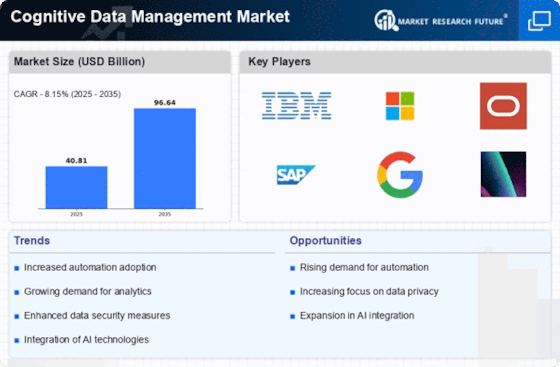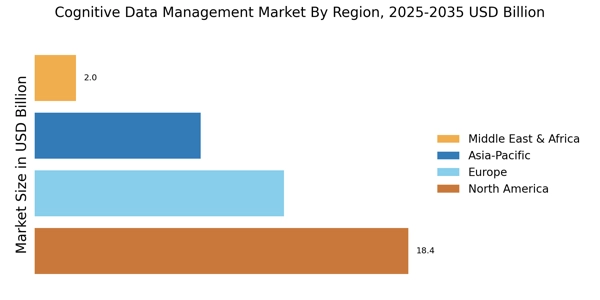Expansion of Cloud Computing Services
The Cognitive Data Management Market is being propelled by the expansion of cloud computing services. As organizations migrate to cloud-based infrastructures, the need for effective cognitive data management solutions becomes increasingly critical. Cloud computing offers scalability, flexibility, and cost-effectiveness, which are essential for managing large volumes of data. The market for cloud services is projected to grow at a rate of around 22%, indicating a robust demand for cognitive data management tools that can operate seamlessly in cloud environments. This trend suggests that organizations are looking for solutions that not only manage data efficiently but also leverage the advantages of cloud technology. Consequently, the Cognitive Data Management Market is likely to evolve, with a focus on integrating cloud capabilities into data management strategies.
Rising Demand for Data-Driven Insights
The Cognitive Data Management Market is experiencing a notable surge in demand for data-driven insights. Organizations are increasingly recognizing the value of leveraging data analytics to enhance decision-making processes. This trend is underscored by a projected growth rate of approximately 25% in the sector over the next five years. Companies are investing in cognitive data management solutions to extract actionable insights from vast datasets, thereby improving operational efficiency and customer engagement. As businesses strive to remain competitive, the need for sophisticated data management tools that can analyze and interpret complex data sets becomes paramount. This growing emphasis on data-driven strategies is likely to propel the Cognitive Data Management Market forward, as organizations seek to harness the power of data to drive innovation and growth.
Increased Regulatory Compliance Requirements
The Cognitive Data Management Market is also shaped by the increasing regulatory compliance requirements across various sectors. Organizations are compelled to adhere to stringent data protection regulations, which necessitate robust data management practices. The rise in data breaches and privacy concerns has led to a heightened focus on compliance, driving investments in cognitive data management solutions that ensure data integrity and security. As companies navigate complex regulatory landscapes, the demand for tools that facilitate compliance with laws such as GDPR and CCPA is expected to grow. This trend not only enhances the credibility of organizations but also positions them favorably within the Cognitive Data Management Market, as compliance becomes a critical factor in data management strategies.
Growing Importance of Data Security Solutions
The Cognitive Data Management Market is witnessing a growing importance placed on data security solutions. As cyber threats become more sophisticated, organizations are prioritizing the protection of sensitive data. This shift is prompting investments in cognitive data management systems that incorporate advanced security features, such as encryption and access controls. The market for data security solutions is anticipated to expand significantly, with estimates suggesting a growth rate of approximately 18% over the next few years. Organizations are increasingly aware that effective data management is not solely about data accessibility but also about safeguarding that data from potential breaches. This focus on security is likely to drive innovation within the Cognitive Data Management Market, as companies seek to develop more secure and resilient data management frameworks.
Advancements in Artificial Intelligence Technologies
The Cognitive Data Management Market is significantly influenced by advancements in artificial intelligence technologies. The integration of AI into data management processes enables organizations to automate data analysis, enhance predictive capabilities, and improve overall data governance. As AI technologies evolve, they offer more sophisticated tools for managing and interpreting data, which is crucial for organizations aiming to leverage big data effectively. The market is projected to witness a compound annual growth rate of around 20% as businesses adopt AI-driven solutions to streamline their data management practices. This trend indicates a shift towards more intelligent data management systems that can adapt to changing business needs, thereby fostering innovation within the Cognitive Data Management Market.

















